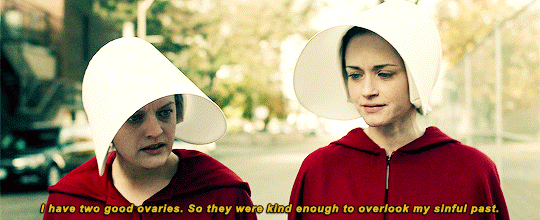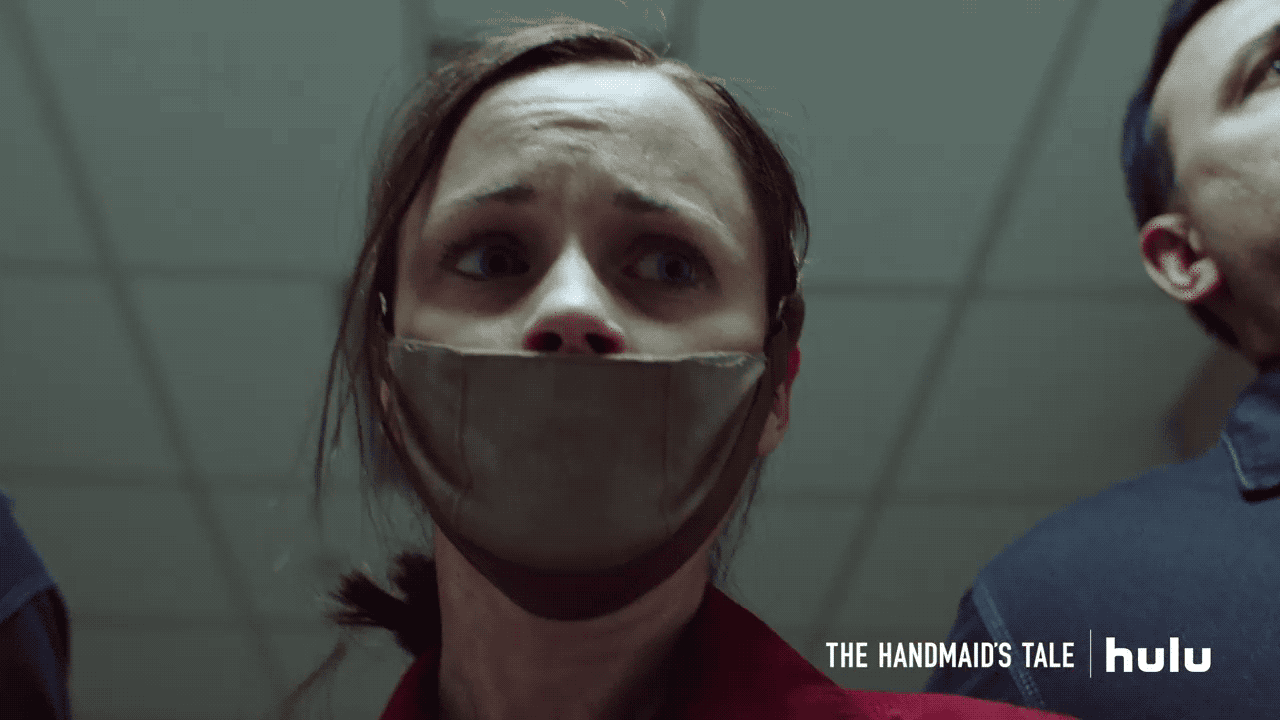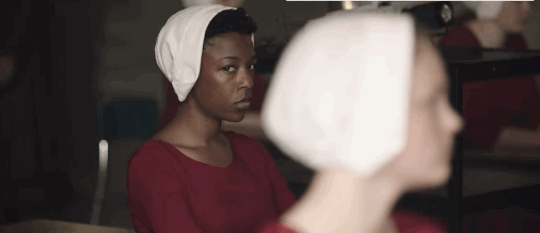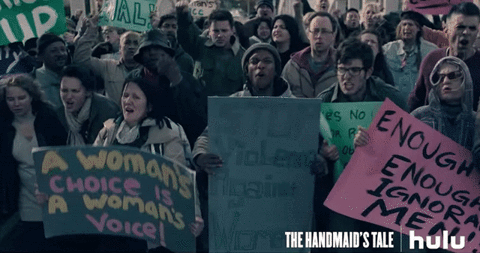LGBTQ viewers outraged by the decades of lesbian character deaths on television had every right to be as incensed as they were when things came to a head last year. Up until now, almost every killing of a queer woman on the small screen had been merciless and without much concern. The being done away with was given as much care as that which went into their creation in the first place—they existed as largely as props, having a singular storyline (or two, if they were lucky), pawns in the greater story revolving around the heteronormative hero’s journeys.
But in the third episode of Hulu’s new series “The Handmaid’s Tale,” there is a (spoiler!) death of a lesbian character who you almost think luckier for her fate, because the alternative is the truer punishment.
Adapted from the 1985 Margaret Atwood novel of the same name, “The Handmaid’s Tale” is the story of a modern internal terrorism taking over the United States—a militant group of Christian fundamentalists quite literally murder the government and enforce laws of their own, disobedience punishable in just about any way imaginable. Because many women have been rendered infertile, prone to miscarriage or even stillbirths, this new group (Sons of Jacob) place women under strict rule with roles assigned according to their ability to successfully procreate. These women become handmaids, servants whose individual purpose is to become impregnated by her master, providing he and his barren wife with a child of their own. Other women who weren’t lucky enough to be married to Sons of Jacob members are allowed to have jobs as Marthas (more typical maid roles who do the cooking and cleaning and other banal but necessary duties of the day) or Jezebels (designated prostitutes who are strictly available for entertainment by the SOJ commanders, and are discarded once they are too old or no longer “suitable” for the job).
Life in the newly formed Republic of Gilead is suffocating, and women are either forced to endure the harshest of horrors or be the ones administering them, for reasons like disagreeing with a policy or asking a question; for talking to someone about anything other than the weather or what to buy from the market, or for any kind of inflection or tone in your voice. There is certainly no tolerance for any other religious views, homosexuality or feminism. Radical politics or politics alternative to anything created and promoted by the Sons of Jacob are automatic death sentences, by whatever means necessary.
The narrator of “The Handmaid’s Tale” is June (played faultlessly by the consistent Elisabeth Moss), but viewers will come to know her as Offred. Before the takeover, she was a young professional and grad student who was happily married with a young daughter (the proof of her ability to successfully child bear). Her new role as a handmaid (to a commander named Fred, thus the name “Offred”) has her removed from that life now, flashbacks our only way of knowing how full her life was, her dedication to her family and her best friend, Moira (Samira Wiley), and their shared values of feminism and equality. Moira is a lesbian, and together, she and June share moments of bewilderment at the rising misogyny that mounts as the Sons of Jacob take over women’s bank accounts, fire them from their jobs, and seize their properties. Instead, they become the properties.

June and Moira are separated after the requisition, but June finds that her only real companion in her new life is also a lesbian. Ofglen (Alexis Bledel in a stirringly serious and cutting role) is June/Offred’s assigned walking companion, and while they are supposed to be serving as spies on one another (or “eyes”), instead, they confide in one another, and Ofglen shares that she had a wife and son who were able to escape to Canada. Ofglen is part of a secret resistance and wants Ofred to get involved, but by the end of the second episode, Ofglen has been replaced by a new handmaid. Then Ofred is brought in for questioning in episode 3, authorities asking what the two of them talked about on their walks, and if Ofred knew Ofglen was a “gender traitor.”
“Did you ever do more than talk?” a soldier asks. “Did she ever touch you? Did she ever try?”
Ofred offers that she knew Ofglen had a wife, back when such a thing was allowed. “I knew she was gay,” she says, and is immediately reprimanded for a word that is “not to be used.”
“That girl,” an Aunt (a high-ranking woman put in charge of handmaids) begins, “that thing was an offense to God; a disgusting beast.”
Ofglen, shown for the first time leading her own scenes (the only to have gotten that distinction outside of June/Ofred thus far) is wearing a menstrual red prison jumpsuit and a muzzle covering her mouth. She’s handcuffed, led by two guards out of a holding cell and into a hallway. Bledel’s icy gaze is impervious at first, but you can see her mind whirring. She doesn’t know what’s about to happen, so she tries one last thing—she reaches her hand up toward a soldier’s bulge, hoping her sexual prowess might once again save her semblance of a life. It doesn’t work—and she’s manhandled into the courtroom in front of a judge who is prepared to deliver a sentence. There’s a Martha to her right, donning a pale green jumpsuit, similar muzzle and terrified stare. Both are being charged with gender treachery. Ofglen, it is declared, is an abomination—“true justice will see you sentenced to an eternity of suffering.” But—“God has seen you as fruitful and by that we are bound.” She is sentenced to “redemption”—the sentence to be carried out immediately.

Thrown into the back of a paddy wagon across from the Martha, Ofglen can no longer control herself, and the tears spill out as she grunts and squeals to try and communicate with her love. Both women lean forward so that they can touch the tips of their hands together, but it’s not long before the truck comes to a stop, the door thrown open, and soldiers collect the Martha, stealing her from the all-too-loose grasp Ofglen had on her. Ofglen is screaming behind her face mask, writhing in agony as she watches the woman she was just touching get shoved through a noose and lifted into the sky, hung in an instant, dead even quicker.
And yet, this is just the beginning of the fulfillment of her “eternity of suffering.”

The next time we see Ofglen, she wakes in a stark white sterile room, lifting her hospital gown to see cotton and gauze covering her below the abdomen. The same Aunt who interrogated Ofred about her friend and their walks appears, and fills Ofglen in.
“The stitches will come out in a few days,” she says. “I know this is a shock for you, Emily. You can still have children of course, but things will be so much easier for you now. You won’t want what you cannot have.”
As Ofglen—Emily—realizes she’s had her clit removed, her blue eyes blur with tears so hot they sting her into a scream. She realizes she’s been stripped of all humanity, and that what she’s being obligated to abide is surely worse than what her lover felt in the second the rope unslacked and her neck was snapped. Ofglen doesn’t reappear until episode 5, and she’s a changed woman—pale, lifeless, a dead woman walking. She sees Ofred in the market, and is standoffish, only showing emotion when she’s emphatic that she now be referred to by her new name: Ofsteven. The only bit of information she can reveal to her friend is that she’s no longer allowed to be a part of the resistance; they find her too dangerous. Now she’s completely alone.
Ofglen/Ofsteven’s only real ally besides Offred is her new commander’s wife, who can see her pain and offers that she’s not feeling very well—perhaps they should reschedule the ceremony that’s set for that evening. “You can’t be sick every month,” Ofglen offers without inflection. “No,” the wife says. “I can’t.” She touches the girl’s shoulder gingerly, but they are both all-too-aware of their circumstances. Ofglen’s purpose is to have sex with this woman’s husband, and produce them a child from the very part of her that has been destroyed. It’s all too much—so when she’s at the outdoor market the next day and sees an opportunity to do something—anything—she dives into the driver’s seat of a car and begins to speed around in circles, running a guard over as others brandishing assault rifles point them and handmaids can’t help but take a moment of joyousness in her freedom. Ofglen herself even lets a smile escape before she’s cut off and forced from the car, and into another vehicle, her future again uncertain.
As for Moira, she’s become a jezebel—a working woman whose entire purpose is to entertain commanders and other higher-ups at secret nightclubs. She was caught trying to leave, and was forced to choose between the colonies (certain death) or becoming a sex worker. “There’s a few good years before your pussy wears out,” she says to Offred when they have a chance meeting. But their conversations are less hopeful now than they used to be—reality has set in, and their current situations seem, well, hopeless.

“The Handmaid’s Tale” is not a TV show for women—it’s a story about the world, told through women, including the experiences of queer women who are major characters given circumstances of their own and not just to qualify the lead straight heroine (not behind or even instead of, but in addition to). In Gilead, women of every identity are persecuted, and queer women, even more so. (The show doesn’t get into issues specific to race, at least not in this first season, but it’s hard to imagine future episodes wouldn’t considering the original novel’s touching on it as well as the show’s progressive awareness in other areas of societal issues and intersectionality. It remains to be seen if June’s husband being black and their child of mixed race may either be of specific relevance in the show, or purposefully none at all.)
Margaret Atwood couldn’t possibly have predicted the eerie applicability her piece of dystopian fiction would have in 2017, but show creator David Miller, pilot writer Ilene Chaiken and director Reed Morano have taken the source material and modernized it with such specific (and some horrific) touches that make “The Handmaid’s Tale” one of the most socially and politically important series of the post-Trump election era. With a group of fundamentalists seeking to control women, minorities and anyone who dare doubt the self-selected authorities, the world June, Moira and Emily live in just before the Sons of Jacob occupation slides way too easily from the day to day resembling our own, into a devastating existence of servitude and unearned civility.
While the first season introduces us to the rules of Gilead, showing us how things now work in a world of severity and Biblical symbolism, there’s something about the women at the center of “The Handmaid’s Tale” that indicate an uprising; a refusal to become complicit because that’s not who they are, or who they ever were. They’ve all made sacrifices and succumbed to assaults and rapes and other injustices they assumed they’d never be faced with, but the revolution is coming, and if we ever needed life and art to intersect more than ever, it’s now.

Women’s lives have value beyond child bearing and rearing and being subservient surrogates, handmaids, cooks or hookers—and their wants (sexually, even) are not invalid. “The Handmaid’s Tale” provides viewers the opportunity to watch how bad things could get were we to be complacent; to stop paying attention just enough that we lose all of the progress we’ve gained because we gave into the blowback and the pressure pushed upon us from the other side. We’re all just moments away from being overthrown by dictators who want to keep us pregnant and mute, frozen in pain and fear, doomed to forget that anything ever felt like something close to pleasure or freedom. Queer women are a special kind of target in that realm—forced into a life of both servitude and heteronormativity that they can only resist by giving up the fight.
“Things will be so much easier for you now. You won’t want what you cannot have.”
“The Handmaid’s Tale” is now streaming on Hulu.

What Do You Think?